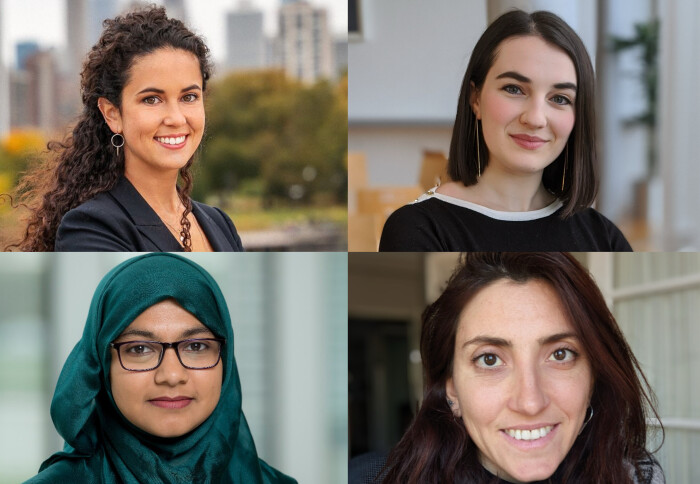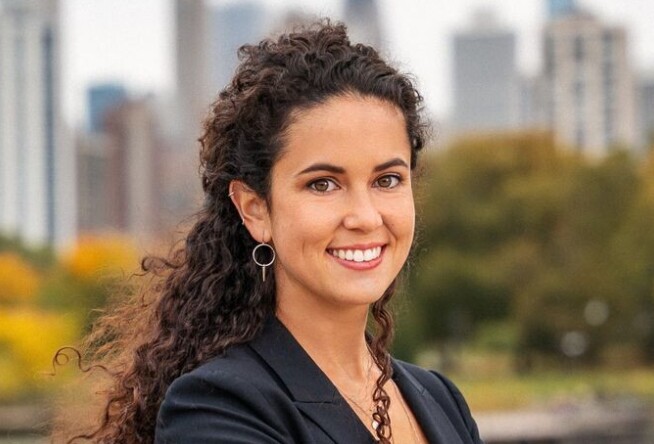Celebrating Early Career Women in Brain Sciences
by Meesha Patel

To mark Women at Imperial Week and International Women's Day we spoke to four Early Career Researchers in the Department of Brain Sciences.
The Department of Brain Sciences Early Career Researcher group is dedicated to supporting all early stage researchers in their academic career. This year's Women at Imperial week theme focuses on 'Invest in women: Accelerate progress' and International Women's day on 8 March focuses on 'Inspiring Inclusion'. We talked to four of our ECR committee members to ask them what this means to them, and why they chose to pursue a field in neuroscience, psychology or psychiatry.
Dr Inés Maldonado-Lasunción, Chair of the ECR Committee

What does International Women’s Day mean to you?
8 March is an opportunity for all of us to recognise and celebrate the many battles that our predecessors have fought to earn the place that women have in society today. While there is a long way to go for equality, I am grateful to the pioneers for finding myself in a position to pursue a neuroscience career, be recognised for my work and afford to believe that I can set my goals "on the moon" if I wish. Because women can take down barriers.
How does your work contribute to the theme of ‘Inspire Inclusion’ or 'Invest in Women'?
As a postdoctoral researcher, I often supervise and mentor bachelor and master students. I put intention in mentoring my students in an inclusive and equitable manner, which I believe gives them a safe and inspiring environment where they can develop themselves as scientists without barriers. In addition, listening to them and tailoring the mentorship to their individual needs usually leads to a mutual learning experience.
Why did you choose to study neuroscience, psychiatry or neurology?
During my biotechnology undergrad, I was fascinated about the nervous system for its electrochemical complexity. Later on, I focused my attention on understanding the neuronal regenerative failure that occurs after central nervous system injury and I have since focused my career on the goal of finding new mechanisms to promote neuronal regeneration. As a woman, I have always kept in mind the figure of Rita Levi-Montalcini, a pioneer neuroscientist that discovered the nerve growth factor and was a model of powerful women in neuroscience.
Dr Jessica Chadwick, ECR Committee member
 What does International Women’s Day mean to you?
What does International Women’s Day mean to you?
To me, International women’s day represents a celebration of fantastic female leaders across sectors, highlighting their expertise and the value they bring to society. It’s an opportunity to build community through role models and mentorship.
How does your work contribute to the theme of ‘Inspire Inclusion’ or 'Invest in Women'?
I am a neuroendocrinologist and study how hormones communicate with neurons. I have included both female and male animals in my experiments, partly for scientific accuracy, but also because female data sets in science are under-represented and under-researched, yet equally important.
Why did you choose to study neuroscience, psychiatry or neurology?
I chose to study neuroscience because I like to know why things work and how they communicate. The central nervous system underpins the majority of biological fields within the human body and is both endlessly fascinating and frustrating in equal measure!
Dr Nurun Fancy, Vice-Chair of the ECR Committee
 What does International Women’s Day mean to you?
What does International Women’s Day mean to you?
I dream of a day when we no longer need an International Women's Day. Until then, it remains a beacon in our fight for a world where every woman, regardless of ethnicity, race, or social status, can pursue her dreams freely.
How does your work contribute to the theme of ‘Inspire Inclusion’ or 'Invest in Women'?
Coming from Bangladesh and as a Muslim woman, I've navigated socio-economic challenges and external perceptions to pursue my current position as a bioinformatician along with various leadership positions. Through roles like Vice-Chair of the DoBS ECR Committee, I've challenged stereotypes, emphasising that intellect transcends ethnicity, race, and background. My journey highlights the importance of perseverance and support from family, friends, and professional networks in breaking barriers. I'm committed to promoting inclusivity and advocating for equal opportunities, serving as an inspiration for others facing similar challenges.
Why did you choose to study neuroscience, psychiatry or neurology?
The combination of my fascination with the human brain and my proficiency in bioinformatics led me to choose neuroscience. I want to understand the mechanisms of neurodegenerative diseases using my data analysis skills. Joining the Multi-omics Atlas project at the UK Dementia Research Institute aligns perfectly with my interests and expertise, allowing me to make meaningful contributions to this vital field.
Dr Alessia Caramello, Communications Lead for the ECR Committee
 What does International Women’s Day mean to you?
What does International Women’s Day mean to you?
International Women’s Day reminds me of all the work and sacrifices women before us have done to raise awareness of gender inequalities in our society and in the workplace. The majority of society is still unaware of the challenges woman face daily at work, often because they don’t question the “set in stone” system established hundreds of years ago. The recent awareness raising of woman leaders in our field makes me optimistic about the future.
How does your work contribute to the theme of ‘Inspire Inclusion’ or 'Invest in Women'?
I’m a strong supporter of an healthy work-life balance, I avoid working long hours or during the weekend. I alternate prioritising personal life or work, depending on needs, and get back some time whenever I give too much. I hope I can be an example of a career in academia that does not require compromising your personal life, particularly for PhD students which are often the most susceptible.
Why did you choose to study neuroscience, psychiatry or neurology?
I think in my case the question to ask is “why you stayed”. I choose to work in neuroscience because I developed a passion towards it over the years. However, I managed to stay exclusively thanks to a great supportive network made of family, friends and colleagues. Despite being mostly made up of women, it also includes some great guys, who, we must remember, face their challenges as well in this modern society. I'm now currently working to to identify which neurons dye first in Alzheimer’s Disease and why, we call this selective neuronal vulnerability.
To find out more about our Early Career Researcher group, how you can join and events visit the ECR group webpage.
Article text (excluding photos or graphics) © Imperial College London.
Photos and graphics subject to third party copyright used with permission or © Imperial College London.
Reporter
Meesha Patel
Faculty of Medicine Centre